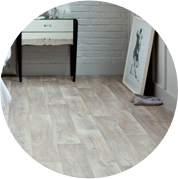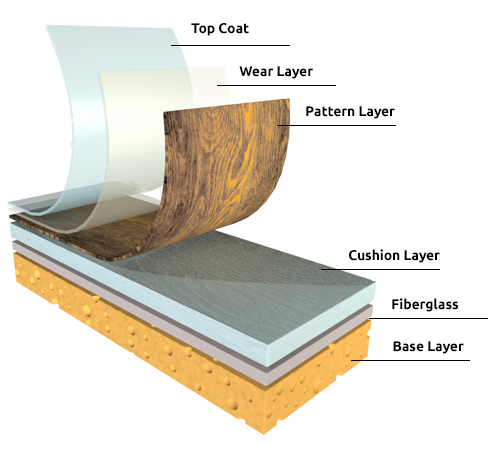What are the Different Types & Styles of Vinyl Flooring?

Vinyl Flooring Types and Styles
The first step in your flooring project will be to choose the type of vinyl that you’ll use in your project, which can be a difficult decision owing to the variety. Vinyl flooring, typically, comes in three distinct styles: sheet, tiles and planks. All three of these types of vinyl flooring have their distinctive benefits, making it a good idea to examine them a little more closely to help you make your decision.
- Sheet Vinyl: The biggest advantage of using sheet vinyl flooring over other types is that it is extremely easy to install, coming in rolls of six to twelve feet. Additionally, sheet vinyl can be had at a very reasonable cost. Generally speaking, one square foot of sheet vinyl will cost a low of $1.20 and a high of $6.40. Price varies significantly based on vinyl grade, for example, commercial grade which holds high traffic loads will cost closer to $6 while simpler grades will reduce the cost to $1 per square foot. The installation cost calculated in separate
- Vinyl Tiles: While more expensive than sheet vinyl, vinyl tiles offer you the option of a number of styles and construction types, making them a good choice for homeowners who like to customize their flooring to the highest degree possible. In terms of cost, vinyl tiles range between $2.50 per square foot to $3.50 per square foot. Commercial grade will cost more than $3.5 however most home users use the home-grade types, which are strong enough for most homes. The installation cost calculated in separate.
- Vinyl Planks: If you want the appearance and durability of hardwood flooring at a fraction of the cost, then an excellent choice is to install vinyl planks in your home. Vinyl planks, as you would expect, are constructed to match their hardwood counterparts almost exactly. When installing vinyl planks in your home, you can expect to pay from $2.50 to $3.50 per square foot. The installation cost calculated in separate.
- LVT (Luxury Vinyl Tile): If you don’t mind paying a little more money, luxury vinyl tile can be a superb choice for your home. LVT can be made to imitate almost any style of flooring thanks to 3D imaging technology. In addition, an embossment layer mimics texture to give your luxury vinyl a more authentic feel. Price wise, you will see a range of $4.29 per square foot to $7.50 per square foot. For exclusive types of LVT vinyls the price might go higher than $7.50. The installation cost calculated in separate.
- Sheet Vinyl vs. Vinyl Tile: The biggest differences between sheet vinyl and vinyl tile comes in terms of design choices and installation options. Sheet vinyl, because it comes in rolls, has only a limited amount of design and installation options, reducing your choices for designing your home. Vinyl tiles, on the other hand, can be produced in almost any style and installed in numerous configuration to give you maximum utility and flexibility. Sheet vinyl will be in most cases cheaper than vinyl tile, and installation of sheet vinyl is about $0.5 cheaper than vinyl tile. Sheet vinyl is now less popular because when the sheet is damaged (from moving furnitures for example) you need to change the whole sheet, versus 2-3 tiles on a vinyl tile.
- Printed vs. Inlaid Vinyl: Printed vinyl and inlaid vinyl differ in their production (construction) process. With printed vinyl, a thin paper pattern is laid down over the vinyl top layer, making printed vinyl a more affordable option. Inlaid vinyl uses granules that make their way through the wear layer to achieve optimal texture and color, causing inlaid vinyl to be slightly more expensive, but much more durable in the long term. Inlaid vinyls are more expensive due to their more complex production process which grants them with authentic look and feel, versus regular print. It can be be compared to paintings: one is laser print and one is oil painted - you’ll be able to see the visual quality difference, same with vinyl.
Vinyl Flooring Layers
Vinyl flooring is constructed in a very delicate process, adding layer after layer until the vinyl is completely assembled. While this can add to the construction times, it makes vinyl flooring one of the more durable flooring solutions you could choose from. Vinyl flooring consists of seven equally important layers, which are as follows:

- Top Coat: The top coat is the uppermost layer of a piece of vinyl flooring, providing the shine typical of vinyl and serving to defend the wear layer from damage.
- Wear Layer: The primary purpose of the wear layer is to protect the pattern layer of your vinyl flooring.
- Pattern Layer: As you might imagine, the pattern layer holds the design and color of your vinyl flooring.
- Cushion Layer: The cushion layer provides both the texture and the function of your vinyl flooring, making it an extremely important part of the construction process.
- Fiberglass: The fiberglass layer is what gives your flooring structure, keeping it flat and preventing curling over time.
- Base Layer: As with the foundation of your home, the base layer of your vinyl flooring keeps all of the other layers in place.
Vinyl Floor Characteristics
The reason that vinyl flooring makes for such an attractive flooring option for homeowners such as yourself is that it comes with a number of characteristics that combine to make it an extremely versatile flooring option. To decide whether vinyl flooring is right for your home, it’s a good idea to examine the benefits of using vinyl flooring very closely. Some of the most important characteristics of vinyl flooring include:
- Wear-Resistance: If you have an active home that experiences a high level of foot traffic, vinyl flooring is a great choice because it resists wear and tear over time, saving you big money on repair or replacement costs.
- Impact Resistance: In addition to resisting typical wear, vinyl flooring is also impact resistant, allowing it to keep its shape even if you drop heavy objects on the floor.
- Slip Resistant: Vinyl flooring is very slip resistant, helping you to avoid nasty falls and increasing the overall safety of your home.
- Heat Insulation: For rooms such as kitchens that experience higher temperatures, vinyl flooring is a great choice because of its resistance to heat, preventing the heat damage that is common to other less durable flooring types.
- Sound-Proof: Thanks to its multi-layer construction, vinyl flooring is also soundproof, helping to keep your home quiet even if you live in a particularly noisy area.
- Moisture-Proof: Water damage is a major concern of many homeowners, which is another reason to choose vinyl flooring. Vinyl is almost completely moisture proof, making it suitable for rooms like bathrooms and kitchens that experience a high volume of spillage.
- Easy to Install: Vinyl flooring, no matter the type you choose, is very easy to install, shortening the length of your flooring project and minimizing disruptions to your life.
- Easy to Clean: Vinyl flooring is a great choice for homeowners with active lifestyles because it is extremely easy to clean, often requiring no more than soap or water.
- Pet Friendly: Because of its durability and easy cleaning, vinyl flooring is also a good choice for homes with pets.
- Less Expensive than Other Floor Types: Finally, but perhaps most importantly, vinyl flooring can be had at a much lower price point than virtually every other type of flooring you could choose.
- Vinyl Floor Installation Cost Calculator
- Vinyl Cost
- Vinyl Flooring Types and Styles
- Vinyl Flooring Installation Methods
- Places Where Homeowners Can Install Vinyl Flooring
- Where Homeowners Can Buy Materials
- Vinyl Floor Installation / Labor Cost
- Vinyl Flooring Maintenance
- DIY or Not. DIY Problems and Limits
- Contractor Hiring Tips



Comments
Comments are disabled for this post